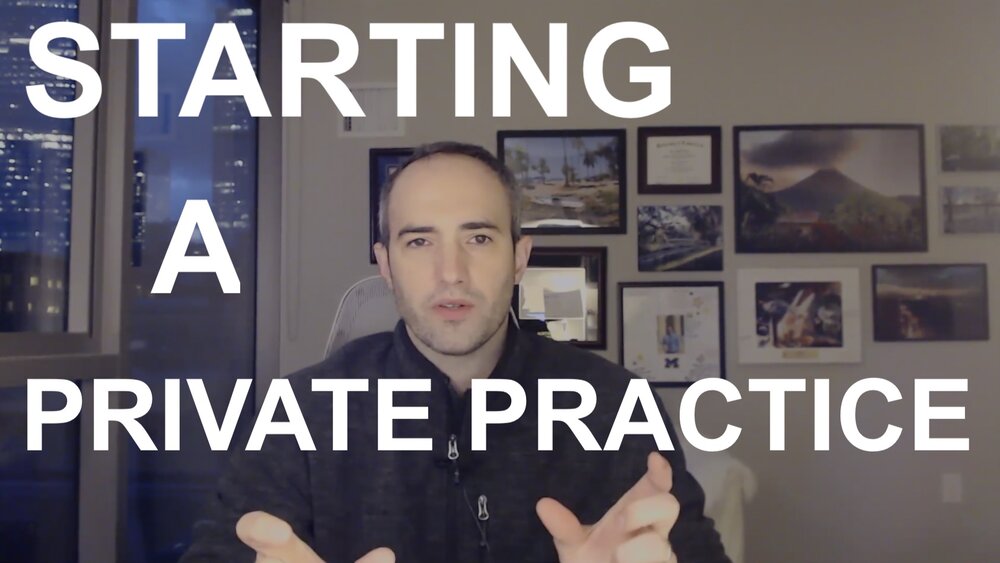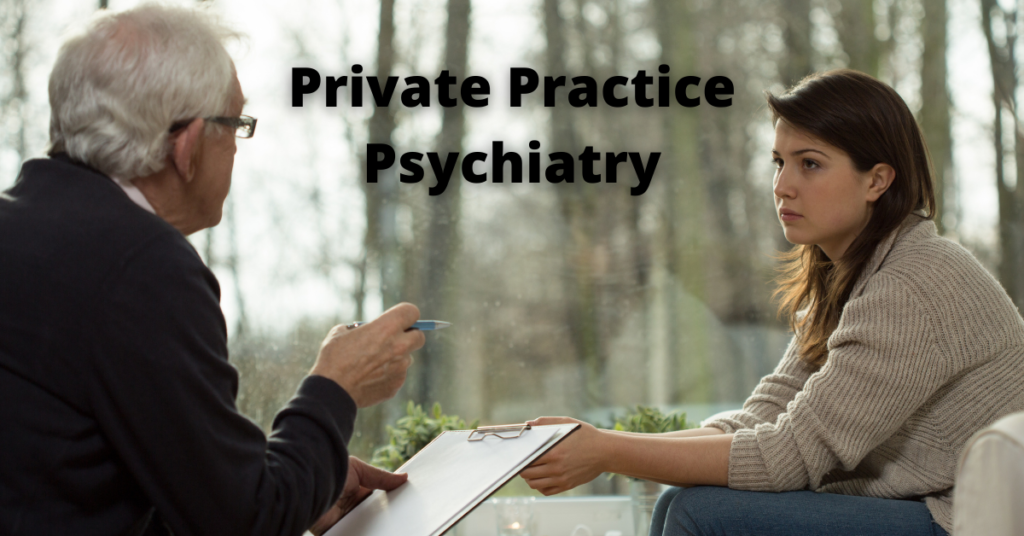It’s true that the medical profession has changed a lot in recent years, but not for the better. The increase of regulations and paperwork has made it difficult to provide quality care. It is no surprise then that many doctors are considering switching careers or opening up their own private practice psychiatry office. If you’re thinking about joining them, it’s important to be aware of all the benefits this change can provide you with.
Contents
- 1 What Is Private Practice Psychiatry?
- 2 Types of Care In Private Practice Psychiatry
- 3 How To Start Private Practice Psychiatry?
- 4 Expectations of Private Practice Psychiatry Session
- 5 Is Private Practice Psychiatry Right For Anyone?
- 6 Benefits of Private Practice Psychiatry
- 7 Disadvantages of Private Practice Psychiatry
- 8 Conclusion
What Is Private Practice Psychiatry?
 Private practice psychiatry is a type of mental health care that is provided by psychiatrists who have their own private practices. This type of care usually involves seeing patients in an office setting, rather than in a hospital or clinic. Private practice psychiatry can be a great option for people who are looking for more personalized care.
Private practice psychiatry is a type of mental health care that is provided by psychiatrists who have their own private practices. This type of care usually involves seeing patients in an office setting, rather than in a hospital or clinic. Private practice psychiatry can be a great option for people who are looking for more personalized care.
This type of care usually costs more than care provided in a clinic or hospital, but many people feel that the extra cost is worth it for the improved level of service.
Types of Care In Private Practice Psychiatry

In a private practice setting, psychiatrists can offer patients several different types of care including:
Individual therapy
This involves meeting with the psychiatrist one-on-one to discuss thoughts and feelings about issues such as stress or self-esteem problems. In many cases, individual therapy will be used in conjunction with other treatments like medication management.
Family Therapy
Some people choose to use family therapy when they feel that their mental health concerns are impacting their loved ones too strongly for them to handle on their own. With this type of treatment plan, all involved parties meet together under the guidance of a therapist who specializes in psychiatry. By having everyone meet at once, it’s possible for deeper root causes behind and emotions to come up more easily.
Group Therapy
Group therapy is a great option for people who want to share their experiences with others and learn from one another. This type of care can provide support and accountability, which can be very helpful for those who are struggling with mental health issues.
Psychotherapy
This term refers to the use of talk therapy in order to help patients deal with various mental health concerns. Psychiatrists who offer private practice psychiatry will often specialize in a certain type of psychotherapy such as cognitive-behavioral therapy (CBT) or dialectical behavior therapy (DBT).
Medication Management
Many psychiatrists also offer medication management services in their private practices. This involves meeting regularly with the patient to discuss how medications are working, make changes if necessary, and provide support.
How To Start Private Practice Psychiatry?

There are several steps that you must take before starting private practice psychiatry. These include:
Choose Specialty
The first step to starting private practice psychiatry is choosing the type of specialty that interests you most. This could be anything from child and adolescent psychiatry to geriatric psychiatry or addiction medicine. However, many psychiatrists choose to specialize in more than one area because it can allow them to serve more patients this way. Some specialties may require additional training compared with others, so make sure you do your research.
Become Licensed & Board Eligible
Before joining the field of private practice psychiatry, individuals must become licensed by their state’s medical board as well as eligible for boards like ABPN (American Board of Psychiatry) and (American Board of Addiction Medicine). This step can be time-consuming and costly, but it is necessary to ensure that you are able to provide quality care to your patients.
Build Practice
Once you have become licensed and board-eligible, the next step is building your practice. This can involve anything from creating a website and online profile to networking with other professionals in your area. It’s important to remember that it may take some time before you start seeing patients, so be patient and keep working at it.
Get Insurance Credentialing
The final step in starting private practice psychiatry is getting insurance credentialing. This process will allow you to bill insurers for the services that you provide to your patients. Not all insurers require credentialing, but it’s best to check with yours to see if it’s necessary.
Advertise Your Services
The final step is advertising your services. This can be done in many ways, such as through social media, online directories, or word-of-mouth. Make sure that you have an attractive website that showcases your skills and experience.
Expectations of Private Practice Psychiatry Session

When you meet with your psychiatrist in a private practice setting, they will likely ask you some questions about your mental health history and current symptoms. They may also ask about your lifestyle and what’s been going on in your life lately. This information is used to create a treatment plan that is tailored specifically for you.
From there, the psychiatrist will work with you to develop goals for therapy and/or medication management. It’s important to remember that these goals should be realistic and achievable- nothing is set in stone!
In many cases, sessions in private practice psychiatry last around 50 minutes. However, this can vary depending on the type of care that is being provided.
Is Private Practice Psychiatry Right For Anyone?
Only you can answer that question! Some people prefer the personal touch that comes with private practice psychiatry, while others find it more affordable to receive care in a clinic or hospital setting. Ultimately, it’s up to you to decide what type of care is right for you.
If you’re curious about private practice psychiatry and would like to learn more, be sure to reach out to your local psychiatrist. They will be more than happy to answer any questions you have.
Benefits of Private Practice Psychiatry

There are several benefits to private practice psychiatry. These include:
Personalized Care
One of the biggest benefits of private practice psychiatry is that patients receive personalized care from their psychiatrist. This means that they can discuss all of their concerns with their doctor and get help addressing them.
Flexibility
Private psychiatrists often have more flexibility than those who work in clinics or hospitals. This means that they can work with patients to find a time that works best for them and accommodate any special requests.
Convenience
Private practice psychiatry can be very convenient for patients. This is because appointments are typically shorter than those in other settings, and psychiatrists often offer medication management services.
Access to Specialists
In some cases, private psychiatrists have access to specialists who may not be available in other settings. This can be helpful for patients who need more specialized care.
Affordability
While the cost of private practice psychiatry will vary depending on the psychiatrist and the location, it tends to be more affordable than receiving care in a clinic or hospital setting. This is because the patient is only paying for the services of one doctor.
Disadvantages of Private Practice Psychiatry
There are many disadvantages of private practice psychiatry. These include:
Limited Availability
Private psychiatrists are often in high demand, which means that appointments may be difficult to come by. Sometimes, patients may have to wait weeks or even months for an appointment.
Higher Cost
Private psychiatry can be more expensive than other forms of mental health care. This is because the patient is paying for the services of one doctor.
Lack of Support
In some cases, private psychiatrists do not have access to support staff such as social workers or therapists. This can be a problem for patients who need more help than what their psychiatrist can provide.
Risk of Becoming Isolated
Private psychiatry can be isolating for patients. This is because they may not have access to the support of other mental health professionals like they would in a clinic or hospital setting.
Uncertainty
The future of private practice psychiatry is uncertain. This means that patients may not be able to continue receiving care from their psychiatrist if they move, switch doctors, or retire.
Conclusion
In conclusion, private practice psychiatry is a good choice for many people. However, it does have several disadvantages that should be taken into consideration before following this path.m This practice offers many benefits, such as the ability to choose your own specialty and patients. It also allows for more flexibility with hours and appointments. However, there are some risks associated with it, such as a lack of support staff and an uncertain future. If you’re thinking about starting private practice psychiatry, make sure you weigh the pros and cons carefully before making a decision.
For more information, please contact MantraCare. Online therapists are increasingly important in today’s world because they provide a convenient and accessible way for people to receive mental health support and treatment. Visit MantraCare If you are searching for “therapist near me”. Book a trial Online therapy session


